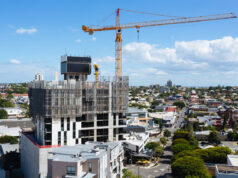The Biden Administration recently released its much-anticipated infrastructure plan in a bid to boost the US economy in the wake of the COVID-19 pandemic.
The US$2 trillion American Jobs Plan includes US$621 billion to improve transport infrastructure, including the repair of 20,000 miles (32,000 kilometres) of roads and 10,000 bridges in an effort to improve road safety and reduce congestion. More than 35,000 people die each year in motor vehicle accidents in the US, representing 12.4 deaths per 100,000 inhabitants, a road toll more than double Australia (5.6) and Canada (5.8).
The plan makes addressing climate change a priority, with US$50 billion earmarked to improve infrastructure resilience and US$35 billion for climate science research. According to the White House, in 2020, the US faced 22 extreme weather and climate-related disaster events with losses exceeding US$1 billion each – a cumulative price tag of nearly US$100 billion.
The proposal includes plans to reduce the country’s reliance on fossil fuels through a US$174 billion investment in the electric vehicle market and the construction of a network of 500,000 EV chargers by 2030.
Also included in the package are plans to overhaul water infrastructure, deliver nationwide high-speed broadband and upgrade the electricity grid. A further US$213 billion is flagged for investment in affordable housing, and more than US$100 billion reserved for education, upgrading public schools, community colleges and childcare facilities. More than US$100 billion is flagged for workforce development programs.
Broad infrastructure definition
Infrastructure investment is overdue in the US, the world’s wealthiest nation but No.13 in the World Economic Forum’s 2019 Global Competitiveness Report rankings for infrastructure (Singapore topped the list, with Australia coming in 29th and New Zealand 46th). According to a White House statement, 20 per cent of the nation’s highways and major roads are in poor condition, as well as 45,000 bridges. At the same time, recent power outages in Texas highlighted weaknesses in the nation’s ageing electricity grid.
Critics have called into question the plan’s far-reaching definition of infrastructure, encompassing not just roads and bridges but also social investment around education, health and caregiving.
President Joe Biden plans to fund the package through a 15-year corporate tax increase from 21 to 28 per cent. The Democrats hope to see Congress approve the legislation by July; however, the bill faces a difficult passage through the Senate where it requires 60 votes to pass.














